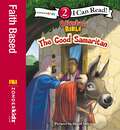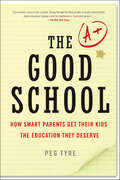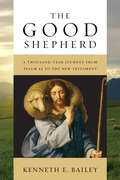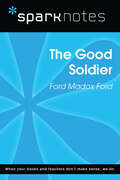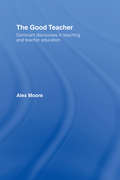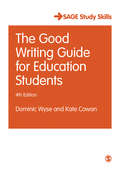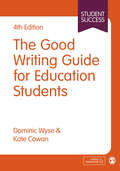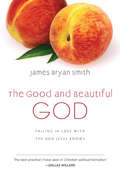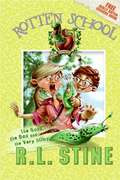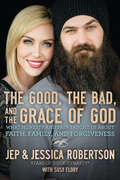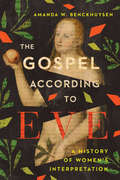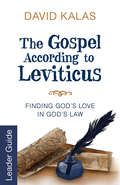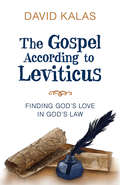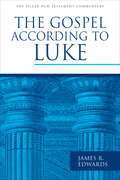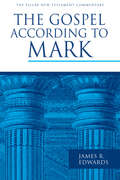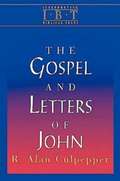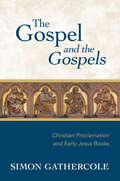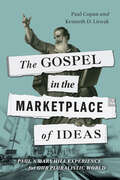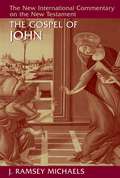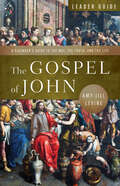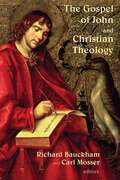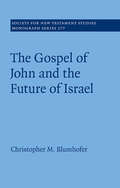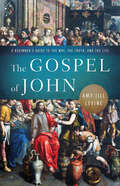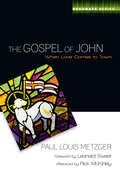- Table View
- List View
The Good Samaritan: Level 2 (I Can Read! / Adventure Bible)
by ZondervanEEver wonder why he is called the &“Good&” Samaritan? When a Jewish man is robbed and left on the side of the road to die, who stops to help? Another Jewish man … or a Samaritan?This is a Level Two I Can Read! book, which means it&’s perfect for children learning to sound out words and sentences. It aligns with guided reading level J and will be of interest to children Pre-K to 3rd grade.
The Good School: How Smart Parents Get Their Kids the Education They Deserve
by Peg TyreAward-winning education journalist Peg Tyre mines up-to-the-minute research to equip parents with the tools and knowledge necessary to get their children the best education possibleWe all know that the quality of education served up to our children in U.S. schools ranges from outstanding to shockingly inadequate. How can parents tell the difference? And how do they make sure their kids get what's best? Even the most involved and informed parents can feel overwhelmed and confused when making important decisions about their child's education. And the scary truth is that evaluating a school based on test scores and college admissions data is like selecting a car based on the color of its paint. Synthesizing cutting-edge research and firsthand reporting, Peg Tyre offers parents far smarter and more sophisticated ways to assess a classroom and decide if the school and the teacher have the right stuff. Passionate and persuasive, The Good School empowers parents to make sense of headlines; constructively engage teachers, administrators, and school boards; and figure out the best option for their child—be that a local public school, a magnet program, a charter school, homeschooling, parochial, or private.
The Good Shepherd and the Stubborn Sheep: A Story of God’s Redemptive Love
by Hannah E. HarrisonThe Good Shepherd and the Stubborn Sheep is a humorous and heartwarming picture book about God's unconditional love. This story beautifully captures the essence of Psalm 23, showing the importance of trusting God, our Good Shepherd, with our lives.Meet George, a silly and sometimes stubborn sheep living happily under the care of a Good Shepherd. But when shearing time comes, George decides it&’s time to make a run for it, and soon finds himself on a journey full of unexpected disappointment, discomfort, and danger. Ultimately, he finds rescue and learns why he really does need a shepherd.The Bible is full of references to sheep and shepherds, but what does it mean to be a good shepherd? And how are we like sheep? The Good Shepherd and the Stubborn Sheep uses an unforgettable character and riveting story to bring biblical truth to life for kids and illustrate the many comforting and loving attributes of God.The Good Shepherd and the Stubborn Sheep is perfect for:Children ages 4 and upFamily devotions and bedtime readingDiscussions about the meaning of Psalm 23, the parable of the lost sheep, and how God is always with usSunday school lessons and church librariesEaster baskets, baptism or First Communion gifts, birthday gifts, and other gift-giving opportunities?
The Good Shepherd: A Thousand-Year Journey from Psalm 23 to the New Testament
by Kenneth E. BaileyLogos Bookstores' 2015 Best Book in Theology/Doctrine/Reference
The Good Soldier (SparkNotes Literature Guide Series)
by SparkNotesThe Good Soldier (SparkNotes Literature Guide) by Ford Maddox Ford Making the reading experience fun! Created by Harvard students for students everywhere, SparkNotes is a new breed of study guide: smarter, better, faster.Geared to what today's students need to know, SparkNotes provides:chapter-by-chapter analysis explanations of key themes, motifs, and symbols a review quiz and essay topics Lively and accessible, these guides are perfect for late-night studying and writing papers.
The Good Teacher: Dominant Discourses in Teacher Education
by Alex MooreMoore's insightful text explores and makes better sense of professional practice by examining that practice in the context of popular views. The book identifies and elaborates three dominant discourses of good teaching: * the competent craftsperson, currently favoured by central governments* the reflective practitioner, which continues to get widespread support among teacher trainers and educators* the charismatic subject, whose popular appeal is evidenced in filmic and other media representations of teaching. All of these are critiqued on the basis of their capacity both to help and to hinder improved practice and understandings of practice. In particular, it is argued that the discourses all have a tendency, if not checked, to over-emphasise the individual teacher's or student teacher's responsibility for successful and unsuccessful classroom encounters, and to understate the role of the wider society and education system in such successes and failures. Winner of a Society for Education Studies book prize in 2005, this is a well-informed source of advice and support for teachers and anyone considering teaching as a career.
The Good Writing Guide for Education Students (SAGE Study Skills Series)
by Professor Dominic Wyse Kate CowanGrappling with grammar? Worrying about referencing? This handy guide is packed with practical advice on how to search for reading materials, structure your academic writing, think critically, reference appropriately and use language effectively. ‘Top Tips’ throughout the book help eradicate all the common mistakes that bring your marks down. What's new to the fourth edition? two brand new chapters on reading and writing critically activities at the end of each chapter to let you check and assess your own writing. With real life examples of academic work, and plenty of ‘dos’ and ‘don'ts’, this is the perfect writing manual for students studying at all levels, and the ideal book to help you get top marks for all your education course assignments. SAGE Study Skills are essential study guides for students of all levels. From how to write great essays and succeeding at university, to writing your undergraduate dissertation and doing postgraduate research, SAGE Study Skills help you get the best from your time at university. Visit the SAGE Study Skills hub for tips, resources and videos on study success!
The Good Writing Guide for Education Students (SAGE Study Skills Series)
by Professor Dominic Wyse Kate CowanGrappling with grammar? Worrying about referencing? This handy guide is packed with practical advice on how to search for reading materials, structure your academic writing, think critically, reference appropriately and use language effectively. ‘Top Tips’ throughout the book help eradicate all the common mistakes that bring your marks down. What's new to the fourth edition? two brand new chapters on reading and writing critically activities at the end of each chapter to let you check and assess your own writing. With real life examples of academic work, and plenty of ‘dos’ and ‘don'ts’, this is the perfect writing manual for students studying at all levels, and the ideal book to help you get top marks for all your education course assignments. SAGE Study Skills are essential study guides for students of all levels. From how to write great essays and succeeding at university, to writing your undergraduate dissertation and doing postgraduate research, SAGE Study Skills help you get the best from your time at university. Visit the SAGE Study Skills hub for tips, resources and videos on study success!
The Good and Beautiful God: Falling in Love with the God Jesus Knows (The Good and Beautiful Series)
by James SmithOver 200,000 sold! "God wants me to try harder." "God blesses me when I'm good and punishes me when I'm bad." "God is angry with me." We all have ideas that we tell ourselves about God and how he works in our lives. Some are true—but many are false. James Bryan Smith believes those thoughts determine not only who we are, but how we live. In fact, Smith declares, the most important thing about a person is what they think about God. The path to spiritual transformation begins here. Turning to the Gospels, Smith invites you to put your ideas to the test to see if they match up with what Jesus himself reveals about God. Once you've discovered the truth in Scripture, Smith leads you through a process of spiritual formation that includes specific activities aimed at making these new narratives real in your body and soul as well as your mind. At the end of each chapter you'll find an opportunity for soul training, engaging in spiritual practices that reinforce the biblical messages on your mind and heart. Because the best way to make a complete and lasting change is to go through the material in community, small group discussion questions also accompany each chapter. Those who are leading apprentice groups will also find additional help and opportunities to interact with other leaders at the Apprentice website, www.apprenticeofjesus.com. This deep, loving and transformative book will help you discover the narratives that Jesus lived by—to know the Lord he knew and the kingdom he proclaimed—and to practice spiritual exercises that will help you grow in the knowledge of our good and beautiful God.
The Good, the Bad and the Very Slimy (Rotten School #3)
by R. L. StineRotten School's bad boy, Bernie B., is trying to turn over a new leaf in order to date the prettiest girl in school, but he may trip over his own slime trail.
The Good, the Bad, and the Grace of God: What Honesty and Pain Taught Us About Faith, Family, and Forgiveness
by Susy Flory Jessica Robertson Jep RobertsonA Moving Story of Redemption and Second Chances Jep Robertson, the youngest son of Duck Commander Phil Robertson, and his wife, Jessica, open up about their personal trials, their early years together, and the challenges that might have destroyed them both had the grace of God not intervened. Jep describes being molested as a child and his reluctance to tell anyone until only a few years ago, his downward spiral into drug and alcohol abuse, and the eventual intervention of his family. Jessica shares about the difficult failure of her first marriage while still a teenager and the hurt that came along with it, much of it from the church. Her insecurities spun out of control as she wondered whether she would ever be good enough or pretty enough. This book is their love story but, more importantly, their love story for God.&“We are desperate to let people know that no matter what you&’ve done; no matter what you&’ve lived through, you can come out of it. You can be washed clean. You are redeemed."
The Gospel According to Eve: A History of Women's Interpretation
by Amanda W. BenckhuysenWhat does it mean to be male and female? Do women and men have different intellectual, spiritual, moral, or emotional capacities? Are women especially suited for serving and men for leading? Are women and men equal? While these may seem like relatively recent questions, they have been a topic of conversation throughout Christian history. At the center of this conversation is the biblical character Eve, the archetypal woman of Genesis 1-3. Not simply one woman among many, Eve comes to represent all women, defining the very essence of what it is to be female. As Eve was a woman, so all women were Eve, the conditions of her creation and her involvement in the Fall often serving as a justification for limitations placed on women and for their subordination to men. Over the centuries, women themselves have read and interpreted the story of Eve, scrutinizing the details of the text to discern God's word for them. Often their investigations led them to insights and interpretations that differed from dominant views, shaped as they were by men. The Gospel According to Eve traces the history of women's interpretation of Genesis 1-3, readings of Scripture that affirmed women's full humanity and equal worth. Biblical scholar Amanda Benckhuysen allows the voices of women from the past to speak of Eve's story and its implications for marriage, motherhood, preaching, ministry, education, work, voting, and more.
The Gospel According to Leviticus Leader Guide: Finding God’s Love in God’s Law (The Gospel According to Leviticus)
by David KalasDo you struggle with knowing how the Old Testament law aligns with the good news found in the New Testament? Following up on When Did God Become a Christian?, author and pastor David Kalas explores what he sees as a rather significant hole in so many American Christians’ experience. For many, while the New Testament is seen as the good news of God’s love through Jesus, the law is set aside as tedious, troubling, or irrelevant. Some even see it as an example of an unloving God in the Hebrew Bible. If we were looking for a ‘review’ on Amazon of the Law, the Psalms would be the five-star. The Psalmist goes on and on, thanking God for it, calling it perfect, and claiming that it revives the soul. In his thoughtful and assuring style, Kalas would like to help readers rediscover that experience of the Old Testament Law. The Leader Guide contains everything needed to guide a group through the six-week study including session plans, activities, and discussion questions, as well as multiple format options.
The Gospel According to Leviticus: Finding God’s Love in God’s Law (The Gospel According to Leviticus)
by David KalasDo you struggle with knowing how the Old Testament law aligns with the good news found in the New Testament? Following up on When Did God Become a Christian?, author and pastor David Kalas explores what he sees as a rather significant hole in so many American Christians’ experience. For many, while the New Testament is seen as the good news of God’s love through Jesus, the law is set aside as tedious, troubling, or irrelevant. Some even see it as an example of an unloving God in the Hebrew Bible. If we were looking for a ‘review’ on Amazon of the Law, the Psalms would be the five-star. The Psalmist goes on and on, thanking God for it, calling it perfect, and claiming that it revives the soul. In his thoughtful and assuring style, Kalas would like to help readers rediscover that experience of the Old Testament Law. Additional components for include a comprehensive Leader Guide for small group study.
The Gospel according to Luke (The Pillar New Testament Commentary (PNTC))
by James R. EdwardsIn keeping with the Pillar New Testament Commentary’s distinctive character, this volume by James R. Edwards on Luke gives special attention to the Third Gospel’s vocabulary and historical setting, its narrative purpose and unique themes, and its theological significance for the church and believers today.Though Luke is often thought to have a primarily Gentile focus, Edwards counterbalances that perspective by citing numerous evidences of Luke’s overarching interest in depicting Jesus as the fulfillment of God’s providential work in the history of Israel, and he even considers the possibility that Luke himself was a Jew. In several excursuses Edwards discusses particular topics, including Luke’s infancy narratives, the mission of Jesus as the way of salvation, and Luke’s depiction of the universal scope of the gospel.While fully conversant with all the latest scholarship, Edwards writes in a lively, fluent style that will commend this commentary to ministers, students, scholars, and many other serious Bible readers.
The Gospel according to Mark (The Pillar New Testament Commentary (PNTC))
by James R. EdwardsThis new Pillar volume offers exceptional commentary on Mark that clearly shows the second Gospel — though it was a product of the earliest Christian community — to be both relevant and sorely needed in today's church. Written by a biblical scholar who has devoted thirty years to the study of the second Gospel, this commentary aims primarily to interpret the Gosepl of Mark according to its theological intentions and purposes, especially as they relate to the life and ministry of Jesus and the call to faith and discipleship. Unique features of James Edwards's approach include clear descriptions of key terms used by Mark and revealing discussion of the Gospel's literary features, including Mark's use of the "sandwich" technique and of imagistic motifs and irony. Edwards also proposes a new paradigm for interpreting the difficult "Little Apocalypse" of chapter 13, and he argues for a new understanding of Mark's controversial ending.
The Gospel and Letters of John: Interpreting Biblical Texts Series (Interpreting Biblical Texts)
by R. Alan CulpepperIn this volume, R. Alan Culpepper considers both the Gospel and the Letters of John. The book begins with a close look at the relationship between John and the Synoptics and a summary of John's distinctive thought and language. The second chapter addresses the fascinating issues regarding the origins of the Gospel and the letters: authorship, sources, and composition. The history of the Johannine community is reviewed in chapter three. Chapter four interprets the plot of the Gospel and prepares the student to read John as literature by providing a brief orientation to narrative criticism. The fifth chapter turns to more traditional concerns: John as theology. This chapter provides a digest of the Christology, theology, and eschatology of John. The sixth through the eighth chapters, the heart of the book, guide the student through a reading of the Gospel. The ninth chapter serves as an introduction to the Letters, noting especially their relationship to the Gospel. Each letter is treated in turn. The final chapter examines the challenges and potential of the Johannine literature as documents of faith. "In previous writings Alan Culpepper has shown himself to be one of the best Johannine scholars of our time. He not only conveniently draws together his research but also shows himself to be an excellent teacher." --Raymond E. Brown
The Gospel and the Gospels: Christian Proclamation and Early Jesus Books (Baylor-mohr Siebeck Studies In Early Christianity Ser.)
by Simon J. GathercoleA robust scholarly defense of the distinctiveness of the canonical Gospels. Is there anything that makes the four New Testament Gospels different from other early Christian Gospels? The tendency among biblical scholars of late has been to declare the answer to this question no—that the Gospels of Matthew, Mark, Luke, and John were grouped together by happenstance and are defended as canonical today despite there being no essential commonalities between them. Simon Gathercole challenges this prevailing view and argues that there are in fact substantial differences of theological content between the New Testament Gospels and noncanonical Gospels. Gathercole shows how the Gospels of Matthew, Mark, Luke, and John each include four key points that also formed the core of early Christian preaching and teaching: Jesus&’s identity as messiah, the saving death of Jesus, the resurrection of Jesus, and Scripture&’s foretelling of the Christ event. In contrast, most noncanonical Gospels—like the Gospel of Thomas, the Gospel of Truth, and Marcion&’s Gospel—only selectively appropriated these central concerns of early Christian proclamation.
The Gospel in the Marketplace of Ideas: Paul's Mars Hill Experience for Our Pluralistic World
by Paul Copan Kenneth D. LitwakOur world is multicultural, multireligious, multiphilosophical. It ranges from fundamental monotheism to do-it-yourself spirituality to strident atheism. How can Christians engage in communicating across worldviews in this pluralistic and often relativistic society? When Paul visited Athens, he found an equally multicultural and multireligious setting. From Jews to Gentiles, elite to poor, slaves to slave owners, from olive-skinned Gentiles to dark-skinned Ethiopians—the Greco-Roman world was a dynamic mix. Religious practices were also wide and varied, with the imperial cult of emperor worship being the most prominent. Many also frequented the temples for the traditional Greek pantheon, and participated in the secret rituals of the mystery religions. Seeking to embolden the church's witness in today's society, philosopher Paul Copan and New Testament scholar Kenneth Litwak show how Paul's speech to the Athenians (found in Acts 17) provides a practical model for Christians today. They uncover the cultural and religious background of this key episode in the apostle?s career and they encourage believers to winsomely challenge the idols of our time to point contemporary Athenians to Christ.
The Gospel of John (New International Commentary on the New Testament (NICNT))
by J. Ramsey MichaelsThis new commentary — part of Eerdmans’s acclaimed NICNT series — gives primary attention to John’s gospel in its present form rather than the sources or traditions behind it.J. Ramsey Michaels assumes that the John who authored the book is someone very close to Jesus and, therefore, that the gospel is a testimony to events that actually happened in the life of Jesus. Yet Michaels does not ignore the literary character of the gospel of John or its theological contribution to the larger Christian community from its own time to the present day. Through a detailed verse-by-verse commentary, Michaels reveals how the gospel of “the disciple whom Jesus loved” is a unified composition, intertwined with the synoptics, yet drawing on material none of them cover.
The Gospel of John Leader Guide: A Beginner’s Guide to the Way, the Truth, and the Life
by Amy-Jill LevineUnlock the hidden depths of John’s Gospel.The leader guide contains discussion questions and session plans for a six-week study of The Gospel of John, by Amy-Jill Levine. It includes opening and closing prayers, optional activities, and session goals for each week and is designed to be used with the book and DVD.John’s Gospel offers readers a new language—of being born anew, of living water, of wind and spirit, of the “I am”—that enhances how we understand the divine, how we experience the world, and how we participate in the mystery of faith.With her characteristic wit and charm, Amy-Jill Levine introduces readers to the world of the Gospel of John by unpacking the stories in their original context, along with examining how the text is read today. This book considers the Gospel of John in its entirety, moving through the Gospel and exploring the prologue, the wedding at Cana, the Samaritan woman at the well and the woman caught in adultery, the healing of the man at the pool and the man born blind, foot washing, Mary Magdalene and Doubting Thomas, and the Lamb of God.
The Gospel of John and Christian Theology
by Richard Bauckham, Carl A. MosserIn recent years, the disciplines of biblical studies and systematic theology have grown apart and largely lost the means of effective communication with one another. Unfortunately, this relational disconnect affects more than just these particular fields of study; it impacts the life of the church as a whole. The first St. Andrews Conference on Scripture and Theology brought leading biblical scholars and systematic theologians together in conversation, seeking to bridge the gap between them. Due to its profound influence on the development of Christian theology, John's Gospel is an ideal base for rekindling fruitful dialogue. The essays here -- taken from the inaugural conference -- consider this Gospel from many angles, addressing a number of key issues that arise from a theological discussion of this text: John's dualism in our pluralist context, historicity and testimony, the treatment of Judaism, Christology, and more. &“This is the beginning of a conversation that can only be enriched by variety and experimentation. . . . It is a signpost . . . pointing towards a not-too-distant future when interdisciplinary conversation and collaboration between these two natural partners will become, no longer occasional and surprising, but a normal and essential element in the flourishing of both.&” -- Richard Bauckham (from the introduction)Contributors: Paul N. Anderson Stephen C. Barton Richard Bauckham D. Jeffrey Bingham C. Stephen Evans Terry Griffith Martin Hengel Kasper Bro Larsen Tord Larsson Judith Lieu Andrew T. Lincoln Jürgen Moltmann Carl Mosser Stephen Motyer Murray Rae Anastasia Scrutton Marianne Meye Thompson Sigve K. Tonstad Alan J. Torrance Miroslav Volf Rowan Williams
The Gospel of John and the Future of Israel (Society for New Testament Studies Monograph Series #177)
by Christopher BlumhoferThe Gospel of John is renowned for the challenges it presents to interpreters: its historical complexity, theological and literary unity, and its consistently critical stance toward characters known as 'the Jews'. There is abundant scholarly literature on each of these challenges, and yet there are very few studies that consider the Gospel as a whole in light of these pressing issues. Mark Blumhofer offers a fresh approach to understanding the Fourth Gospel, one that draws together the insights of scholarship in all of these areas. He shows that a historically sensitive, ethically attuned, and theologically and literarily compelling reading of the Fourth Gospel lies before us in the synthesis of the approaches that have long been separated. Unlike studies that consider only a narrow portion of the Gospel, Blumhofer's unique approach draws on most of it and shows how common themes and interests run throughout the narrative of John.
The Gospel of John: A Beginner’s Guide to the Way, the Truth, and the Life
by Amy-Jill LevineUnlock the hidden depths of John’s Gospel.John’s Gospel offers readers a new language—of being born anew, of living water, of wind and spirit, of the “I am”—that enhances how we understand the divine, how we experience the world, and how we participate in the mystery of faith. With her characteristic wit and charm, Amy-Jill Levine introduces readers to the world of the Gospel of John by unpacking the stories in their original context, along with examining how the text is read today. This book considers the Gospel of John in its entirety, moving through the Gospel and exploring the prologue, the wedding at Cana, the Samaritan woman at the well and the woman caught in adultery, the healing of the man at the pool and the man born blind, foot washing, Mary Magdalene and Doubting Thomas, and the Lamb of God.Components available to use this book in a small group study include a leader guide and video available on DVD.
The Gospel of John: When Love Comes to Town
by Paul L. MetzgerThe Resonate series recovers the ancient wisdom of Scripture and helps us understand how it resonates with our complex world. The stories and insights of each book of the Bible are brought into conversation with contemporary voices of hope and lament--the cultural messages we interact with on a daily basis. The Scriptures become a meeting ground where God speaks to the pressing concerns of our day, and we are confronted in turn with a fresh experience of God's truth. In this journey through the Gospel of John, Paul Louis Metzger wrestles with the question of what happens when God, who is love, comes to town and takes up residence among us. For some this new neighbor love is welcome; for others, unusual; for still others, suspect--even dangerous. We learn from John's Gospel what it means to be called friends and lovers of God, what it means to put love to death and what it means for love to rise again in our midst and in our lives.
